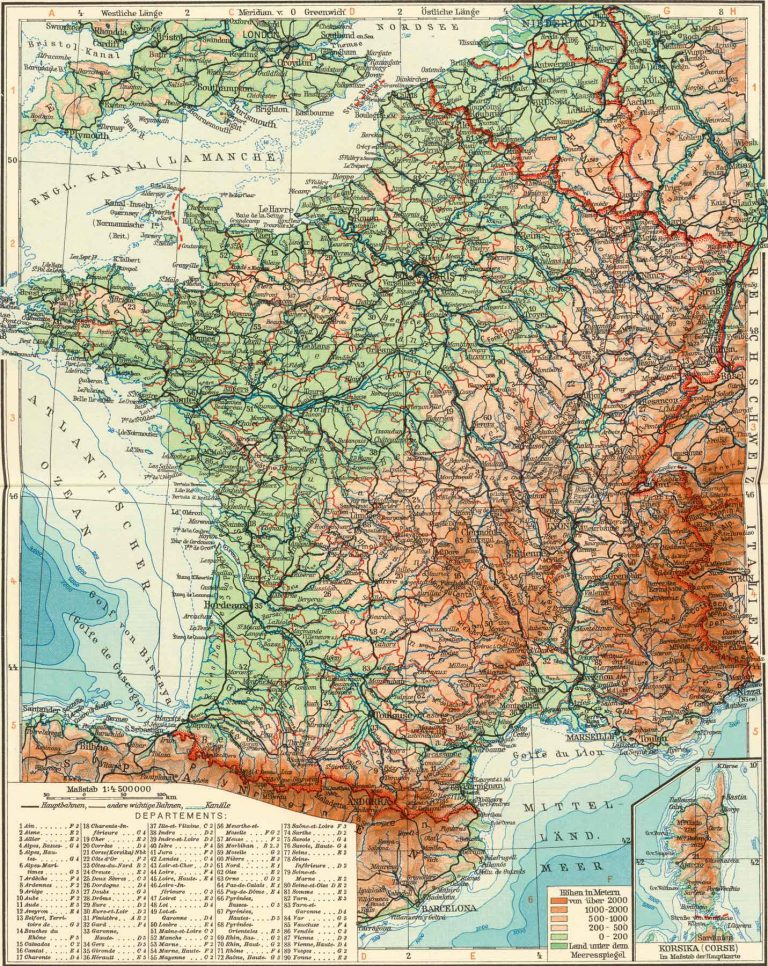
France
Policy on Immigration and Refugees
In the first third of the 20th century, France becomes one of the world’s most important destinations for immigrants. Its liberal immigration policy continues into the first months of 1933 under the new government of Prime Minister Édouard Daladier. France’s representatives to the German Reich are encouraged to lift visa restrictions for refugees from Germany.
Meanwhile, the economic and social impacts of the global economic crisis, which reach France in mid-1933, as well as the increasing influence of right-wing conservative and antisemitic trends, lead to a gradual tightening of entry regulations. By July 1933 the Ministry of the Interior requires German emigrants to hold a valid passport as a condition for obtaining residency. In 1934 and 1935, people of non-French backgrounds are gradually barred from practicing certain trades, including law and medicine, and are required to present a French employment contract in order to obtain a work permit.
In 1936, after the formation of a popular front government under France’s first Jewish prime minister, Léon Blum, some of the restrictive measures are lifted. At the same time, right-wing conservative opposition campaigns against the “Jewish-Bolshevist” government lead to broader public support for antisemitic and anti-communist ideas.
The return of Daladier as prime minister in April 1938 brings a significant tightening of immigration laws. In May, as a response to illegal border crossings of Jewish refugees following the “annexation” of Austria, a decree imposes heavy fines and imprisonment for all violations of residency regulations. In addition, a 1935 decree that had permitted limited entry to relatives of those already in France is repealed in 1939. Nevertheless, some 100,000 Jewish refugees from Germany and Austria manage to enter the Republic between 1933 and 1939.
With the outbreak of World War II, all German and Austrian refugees are considered “enemy aliens” and are interned in camps. After the start of the German occupation in the north and the establishment in the south of the État Français, or “Vichy-France,” in the summer of 1940, numerous anti-Jewish laws are enacted in both parts of the country.
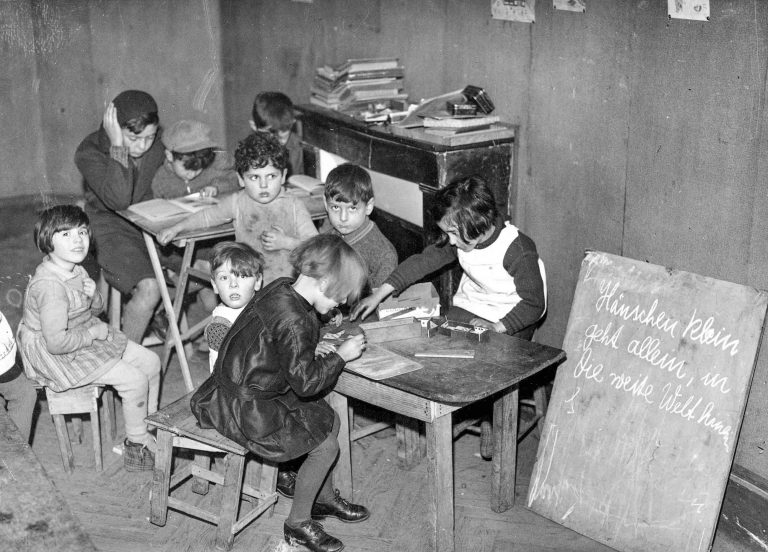
Children of Jewish refugees from Germany enjoy a recess from their provisional schooling in an empty building on Boulevard MacDonald in December 1933 in Paris
Collection Cegesoma, Brüssel, DO4 AGR 51689
Children of Jewish refugees from Germany enjoy a recess from their provisional schooling in an empty building on Boulevard MacDonald in December 1933 in Paris
Collection Cegesoma, Brüssel, DO4 AGR 51689
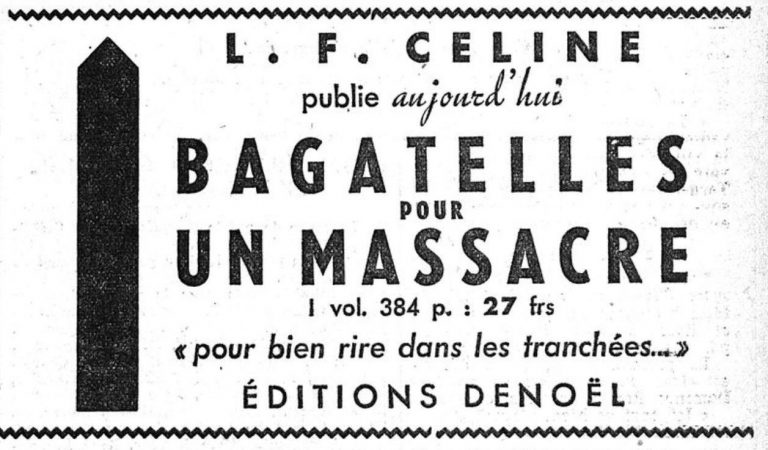
Ad in the right-wing nationalist and monarchist daily newspaper Action Française, December 23, 1937
The advertised pamphlet “Bagatelles pour un massacre” (trifles for a massacre) propagates virtually all common anti-Jewish clichés and posits a “Jewish world conspiracy.” Its author, Louis-Ferdinand Céline, deliberately focuses on “antisemitism” to drum up a large readership. The German translation is published in 1938 as “Die Judenverschwörung in Frankreich.”
L’Action Française, 23. Dezember 1937 / Bibliothèque Nationale, Paris
Ad in the right-wing nationalist and monarchist daily newspaper Action Française, December 23, 1937
The advertised pamphlet “Bagatelles pour un massacre” (trifles for a massacre) propagates virtually all common anti-Jewish clichés and posits a “Jewish world conspiracy.” Its author, Louis-Ferdinand Céline, deliberately focuses on “antisemitism” to drum up a large readership. The German translation is published in 1938 as “Die Judenverschwörung in Frankreich.”
L’Action Française, 23. Dezember 1937 / Bibliothèque Nationale, Paris
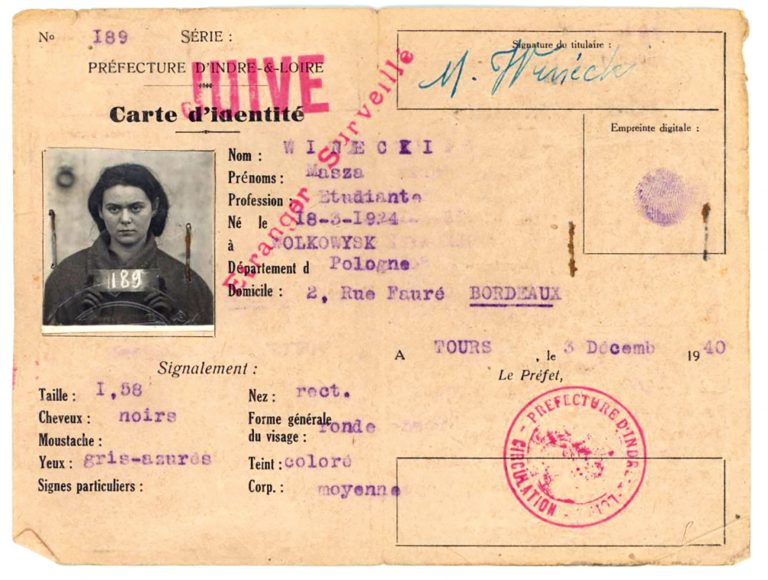
Identity card of Masza Winecki, stamped “Jew” and “foreigner under surveillance”
On October 4, 1940, the Vichy government enacts a law allowing prefects, or regional governors, to immediately detain foreigners of the “Jewish race.” Under this edict, the Polish-born schoolgirl Masza Winecki and her family are deported to the La Lande internment camp in Monts in 1941, and from there to Auschwitz via Drancy in 1942.
Archives départementales d’Indre et Loire, Tours
Identity card of Masza Winecki, stamped “Jew” and “foreigner under surveillance”
On October 4, 1940, the Vichy government enacts a law allowing prefects, or regional governors, to immediately detain foreigners of the “Jewish race.” Under this edict, the Polish-born schoolgirl Masza Winecki and her family are deported to the La Lande internment camp in Monts in 1941, and from there to Auschwitz via Drancy in 1942.
Archives départementales d’Indre et Loire, Tours
Delegation
Henry Bérenger
* 22 April 1867 Rugles † 18 May 1952 Saint Raphaël
After studying literature, Henry Victor Bérenger takes up a career in publishing. One of his publications is the newspaper L’Action. From 1912 to 1945, as a member of the middle-class left-wing Parti Radical, he is elected representative of the French overseas department of Guadeloupe to the French Senate.
In the mid-1920s Bérenger is named ambassador to the US. In this role he participates in establishing what will become the Young Plan for German reparations after World War I. After his return to France, Bérenger devotes himself more fervently to foreign policy, serving as chair of the Committee on Foreign Affairs until 1939.
Bérenger abstains from the French National Assembly’s vote on whether to grant sweeping powers to Philippe Pétain following the Armistice of June 22, 1940. He withdraws to the Côte d’Azur and makes few political appearances for the rest of his life. In 1944, the Parti Radical expels him for failing to stand up to the German occupation.
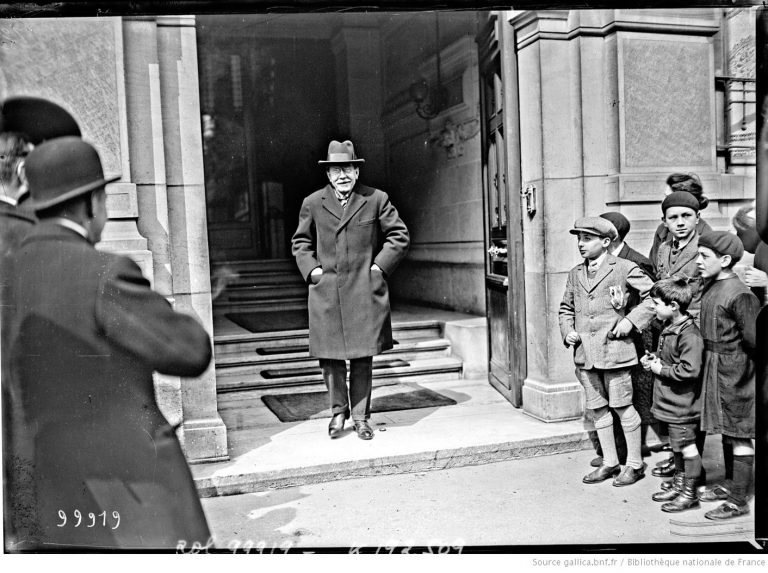
Henry Bérenger after visiting Aristide Briand on April 14, 1925
Bibliothèque Nationale, Paris / bnf.gallica.fr
Henry Bérenger after visiting Aristide Briand on April 14, 1925
Bibliothèque Nationale, Paris / bnf.gallica.fr
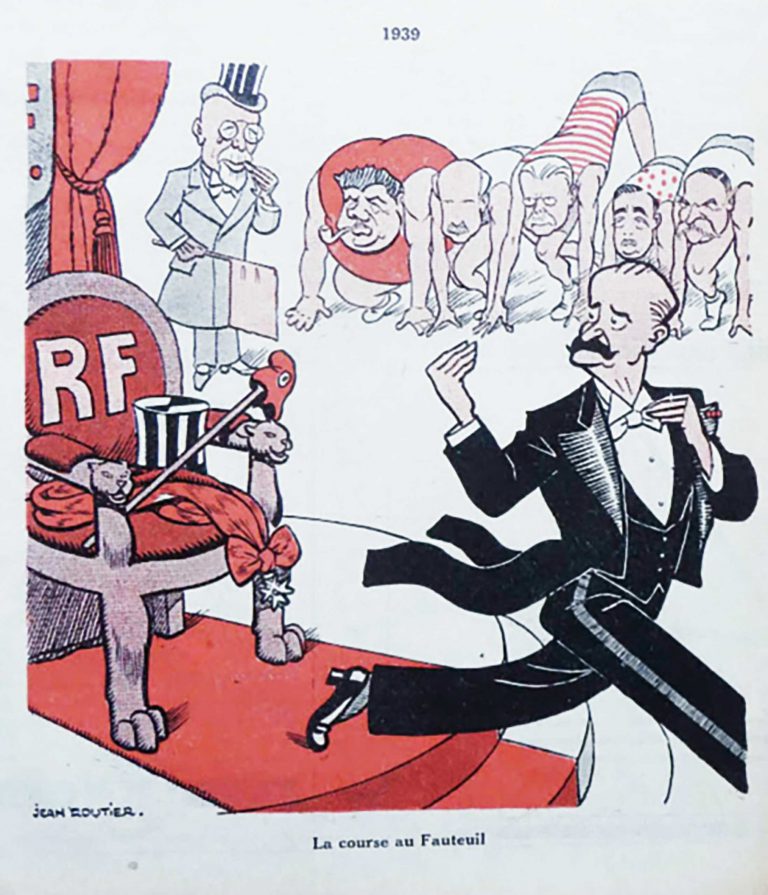
Cartoon: “La course au fauteuil” (the race for the armchair) from the satirical magazine Cri de Paris of December 30, 1938
Third from right: Henry Bérenger. In 1938, the French media speculates about Bérenger’s possible candidacy for president. But he has no such ambitions.
Cartoon: Jean Routier / Bibliothèque historique de la ville de Paris
Cartoon: “La course au fauteuil” (the race for the armchair) from the satirical magazine Cri de Paris of December 30, 1938
Third from right: Henry Bérenger. In 1938, the French media speculates about Bérenger’s possible candidacy for president. But he has no such ambitions.
Cartoon: Jean Routier / Bibliothèque historique de la ville de Paris
Georges Coulon
Dates of birth and death unknown
Georges-Joseph Coulon’s career begins as deputy financial auditor in French West Africa; from 1912 to 1921 he serves as the central agent of the colonial banks. In 1911 he and his brother Henri found the Agence Économique et Financière, a financial newspaper in which their brother Edouard also plays a part. Coulon works here through the end of the 1930s in roles that include managing director and publisher.
As a Parisian cosmopolitan, he has excellent contacts in both politics and banking. Although criticized for speculation and dubious business practices, he is considered an influential and internationally well-connected diplomat and an expert in finance and the colonies.
As a delegate to the Évian Conference and the follow-up negotiations, he is treading on familiar ground. In 1940 he and his wife, Lucie, leave occupied France. He continues working on behalf of refugees and becomes a member of the Coordinating Foundation of the War Refugee Board in New York, where Coulon resides until at least 1949.
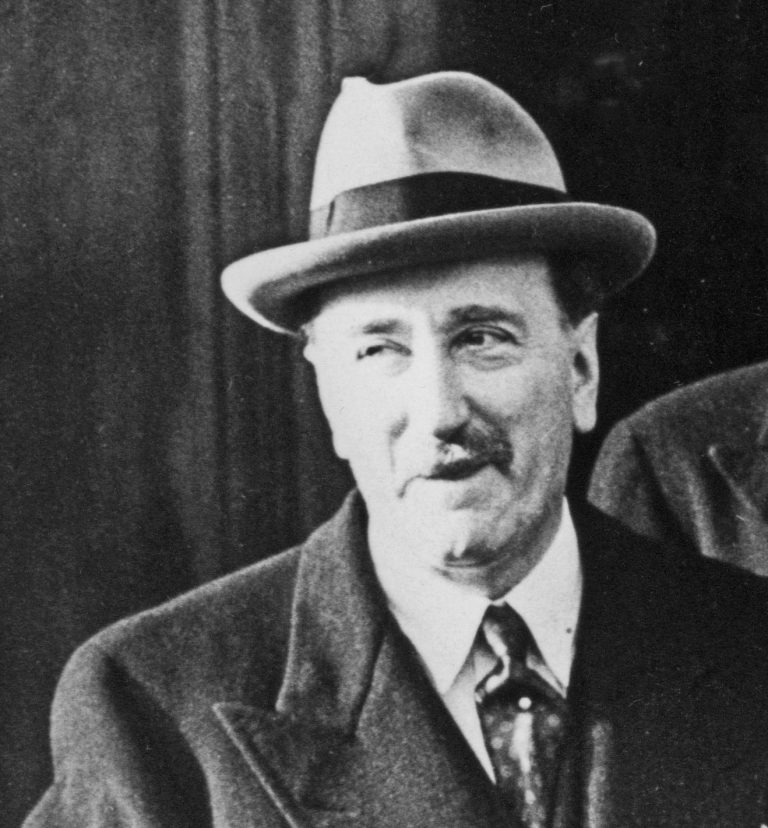
Georges Coulon as member of the French delegation at a meeting of the Intergovernmental Committee, London, December 1938 (Detail)
Coulon works closely with Bérenger. They have known each other since their days in the colonies and as longstanding members of the middle-class, left-wing Parti Radical. Bérenger was the best man when Coulon married his first wife, Madeleine Courtin, in Paris in 1921.
SZ Photo, München
Georges Coulon as member of the French delegation at a meeting of the Intergovernmental Committee, London, December 1938 (Detail)
Coulon works closely with Bérenger. They have known each other since their days in the colonies and as longstanding members of the middle-class, left-wing Parti Radical. Bérenger was the best man when Coulon married his first wife, Madeleine Courtin, in Paris in 1921.
SZ Photo, München
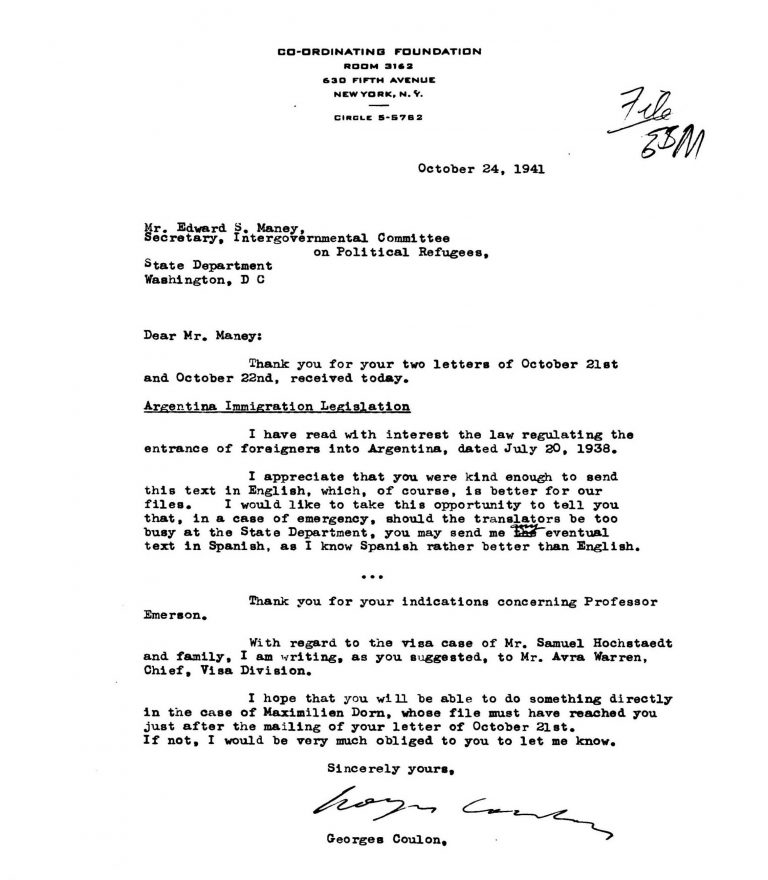
Letter from Georges Coulon to Edward Maney of the Intergovernmental Committee for Refugees regarding entry into Argentina, October 24, 1941
In the US, Coulon continues his work begun in Évian. Thanks to his contacts in Latin America and his knowledge of Spanish, he is well suited to the search for refugee settlement possibilities. He also supports the French Resistance.
National Archives, College Park, MD
Letter from Georges Coulon to Edward Maney of the Intergovernmental Committee for Refugees regarding entry into Argentina, October 24, 1941
In the US, Coulon continues his work begun in Évian. Thanks to his contacts in Latin America and his knowledge of Spanish, he is well suited to the search for refugee settlement possibilities. He also supports the French Resistance.
National Archives, College Park, MD
Pierre Bressy
* 7 July 1890 Asnières † 3 December 1973 Paris
Pierre Gaston Prosper Bressy is the son of a pharmacist. After successfully completing his studies in law and political science, in 1914 he takes off to serve as a soldier in World War I. As of September 1919, he participates in the Versailles Peace Conference on the staff of the General Secretariat. That same year he begins his career in the Foreign Service and in 1938 becomes Head of the Press and Information Service of the French Ministry of Foreign Affairs.
Bressy attends the Évian Conference as Minister Representative and Deputy Director of the Ministry of Foreign Affairs. His career continues after the German occupation and the proclamation of the État Français in Vichy. Between 1940 and 1944, one of his roles is deputy director of political and commercial affairs.
In February 1945, he is forced into an early retirement; five years later, he is completely rehabilitated. In the early 1950s, he represents France in several functions as a delegate to the United Nations.
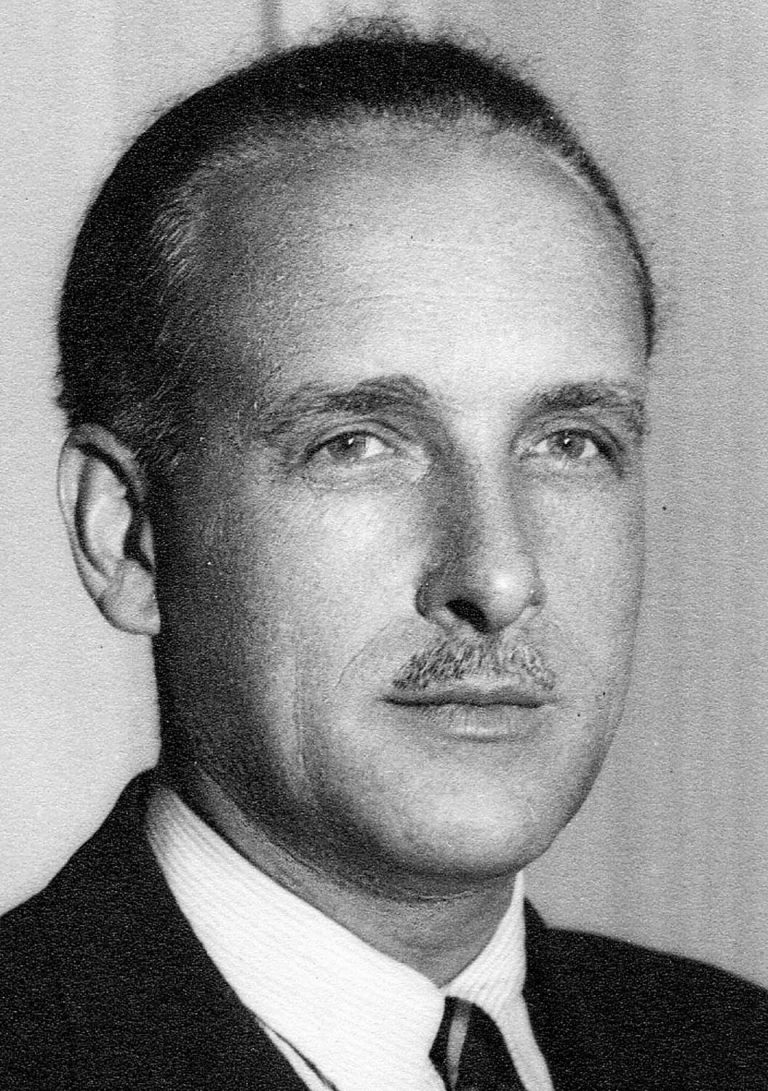
Pierre Bressy, before 1940
Private collection
Pierre Bressy, before 1940
Private collection
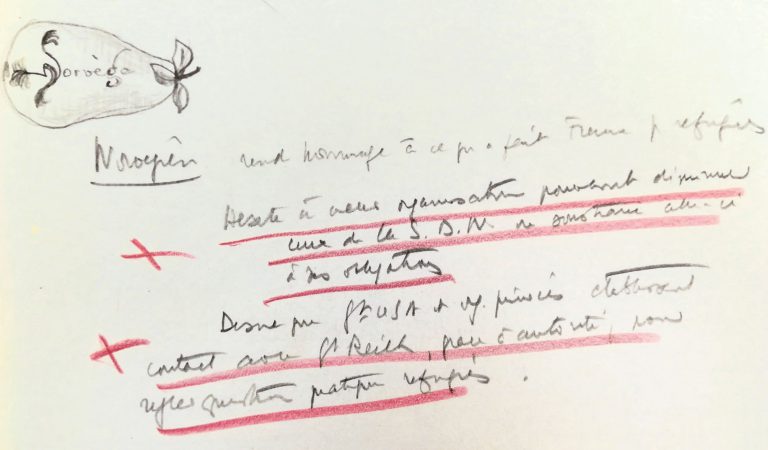
Pierre Bressy’s notes from the opening day of the Évian Conference, July 6, 1938
Bressy takes notes and draws a pear during the presentation by the Norwegian delegate, Michael Hansson. Bressy, as chair of the conference’s technical subcommittee, is responsible for its organization and technical implementation.
Archives diplomatiques du Ministère des Affaires étrangères, La Courneuve
Pierre Bressy’s notes from the opening day of the Évian Conference, July 6, 1938
Bressy takes notes and draws a pear during the presentation by the Norwegian delegate, Michael Hansson. Bressy, as chair of the conference’s technical subcommittee, is responsible for its organization and technical implementation.
Archives diplomatiques du Ministère des Affaires étrangères, La Courneuve
François Seydoux de Clausonne
* 15 February 1905 Berlin † 30 August 1981 Paris
Auguste Louis François Seydoux Fornier de Clausonne is born into a wealthy Protestant family in Berlin, where his father is the French ambassador. Following in his father’s footsteps, Seydoux studies law and politics in Paris and enters the diplomatic corps in 1928. In 1933 he is named secretary in the French Embassy in Berlin; in 1936 he transfers to the Foreign Ministry in Paris, where he heads the Germany department.
After a brief stint in Budapest under the Franco-German ceasefire agreement, Seydoux resigns in 1942 and joins the French Resistance as a foreign affairs expert.
After World War II, he continues his diplomatic career, becoming head of the Europe department in the Foreign Ministry in 1949. In 1955 he moves to Vienna as ambassador to Austria, followed by his appointment as ambassador to West Germany in Bonn, in 1958. Aside from his three years as NATO ambassador, Seydoux remains in Bonn for the remainder of his diplomatic career; afterwards, he works as a consultant and writer.
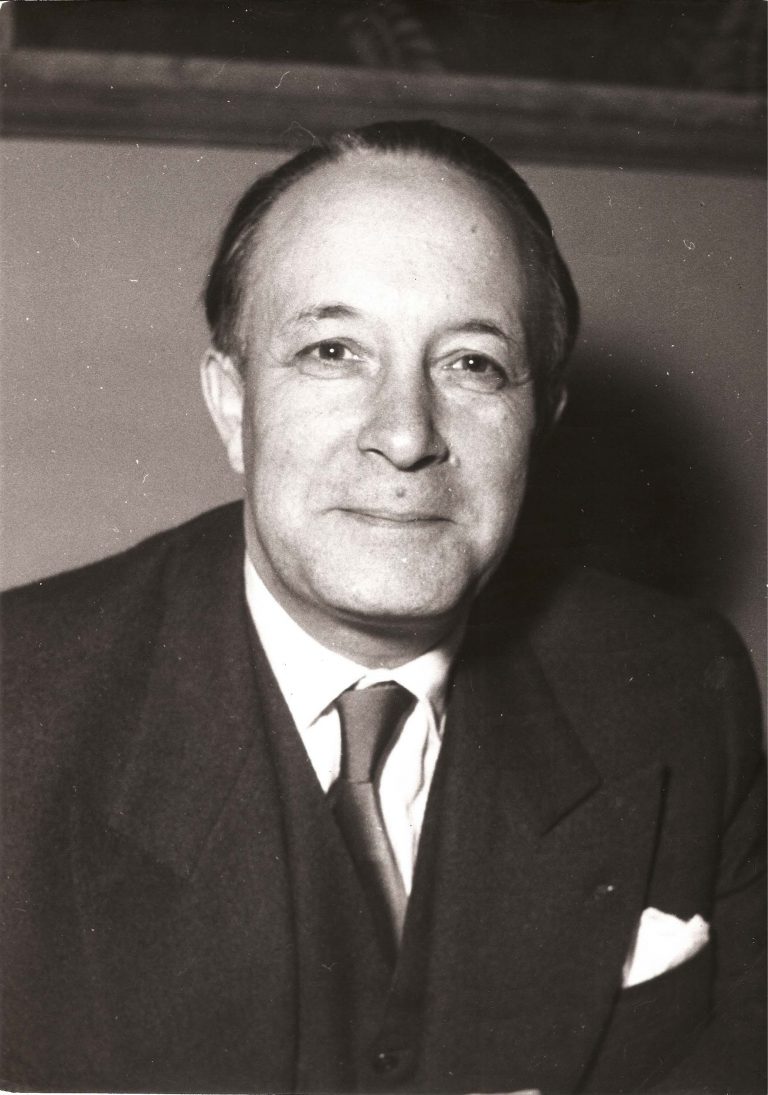
François Seydoux after his appointment as ambassador to Austria, May 5, 1955
Seydoux, who worked in Berlin during the 1930s, represents France in West Germany beginning in 1958. He concludes his long diplomatic career there in 1970, when he is awarded the Charlemagne Prize for his service to Franco-German relations, which includes his instrumental role in crafting the Élysée Treaty.
Keystone Pictures USA / Alamy Stock Foto
François Seydoux after his appointment as ambassador to Austria, May 5, 1955
Seydoux, who worked in Berlin during the 1930s, represents France in West Germany beginning in 1958. He concludes his long diplomatic career there in 1970, when he is awarded the Charlemagne Prize for his service to Franco-German relations, which includes his instrumental role in crafting the Élysée Treaty.
Keystone Pictures USA / Alamy Stock Foto
Louis Baron Brincard
* 29 March 1902 Paris † 17 June 1992
Antoine Louis Jean Brincard is the youngest son of the well-known banker Baron Georges Brincard, who heads Crédit Lyonnais, one of France’s oldest and largest banks, from 1922 to 1945. Brincard grows up in a fashionable Parisian residential hotel and successfully concludes his studies in literature and law in 1927.
With help from his cousin Roland de Margerie, who serves as France’s ambassador to Germany among other roles, he enters the diplomatic corps in 1929. After serving on diplomatic missions in Berlin and the League of Nations, he is appointed embassy attaché to the Holy See on June 5, 1940.
But he holds this position only briefly. In August, Paul Baudouin, Foreign Minister of the Vichy government, orders that Brincard be released from duty after he is investigated for attempting to transfer funds abroad. Brincard only returns to the Foreign Ministry in 1947, serving in various administrative functions.
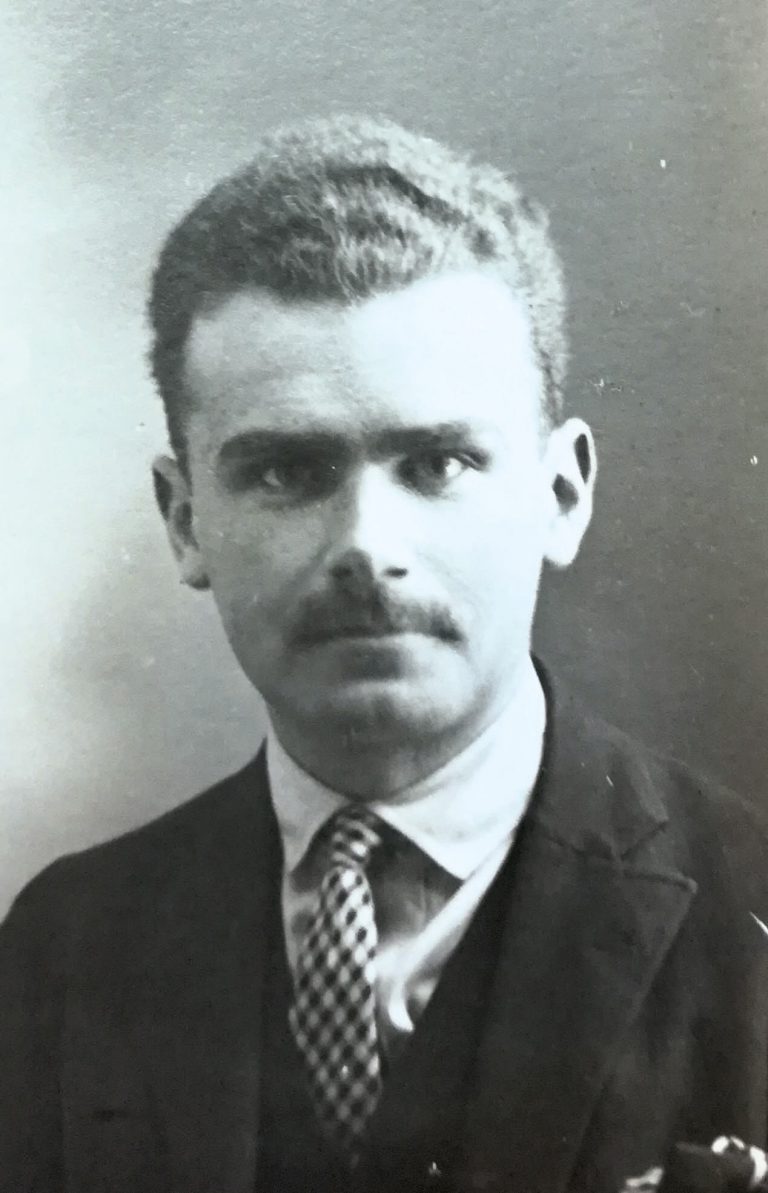
Louis Baron Brincard, ca. 1929
Identity card photo from his personnel file
Archives diplomatiques du Ministère des Affaires étrangères, La Courneuve
Louis Baron Brincard, ca. 1929
Identity card photo from his personnel file
Archives diplomatiques du Ministère des Affaires étrangères, La Courneuve
Yves Fourcade
* 26 December 1893 Bordeaux † unknown
Yves Etienne Fourcade is the son of a notary’s assistant. He follows in his father’s footsteps and completes a degree in law. As a civil servant, he assumes the post of deputy director of the French immigration authority in August 1938.
His career is not interrupted by Germany’s occupation of France and the establishment of the État Français in the unoccupied southern zone. He becomes director of the Foreign Police and thus is responsible for, among other tasks, coordinating and executing the deportations beginning in summer 1942. His collaboration facilitates the deportation of 10,000 Jews via the Drancy transit camp to the Auschwitz-Birkenau death camp, where they are murdered.
After the liberation of France, Fourcade is merely forced into an early retirement despite his collaboration. Twelve years later, he manages to have his pension restored for the years of his suspension from civil service.
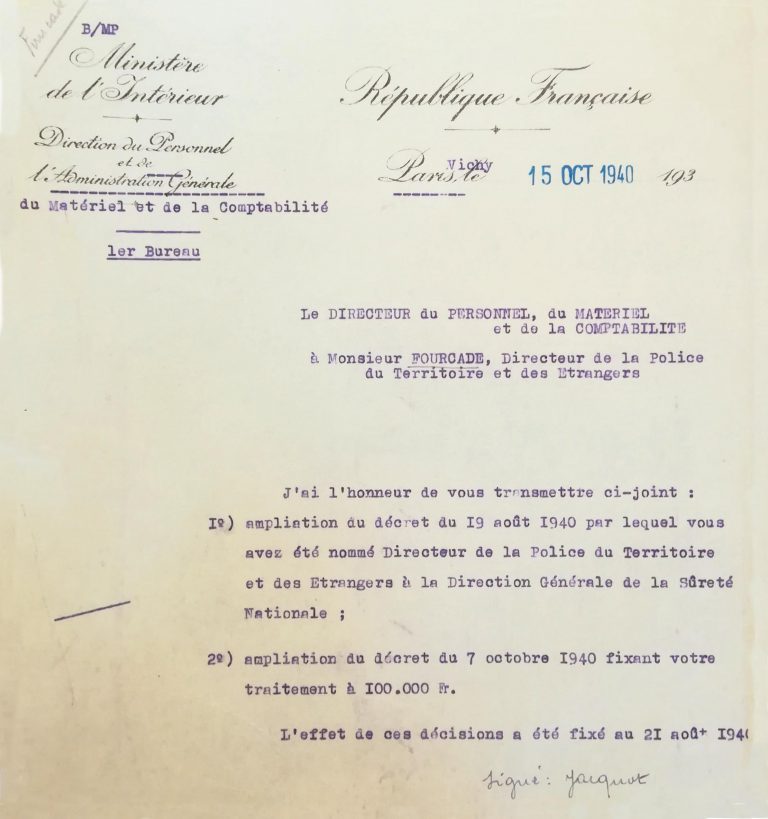
Letter from the État Français Ministry of the Interior personnel director, appointing Yves Fourcade as head of the French Foreign Police, October 15, 1940
Archives Nationales, Paris, F/1bI/1129
Letter from the État Français Ministry of the Interior personnel director, appointing Yves Fourcade as head of the French Foreign Police, October 15, 1940
Archives Nationales, Paris, F/1bI/1129
Pierre Combes
* 14 April 1893 Cras † 8 September 1966 Rion-des-Landes
The son of a road worker, Pierre Joseph Faustin Combes is raised in humble surroundings and works his way up to becoming a teacher. After serving in World War I, he studies law and begins a career in the French civil service.
At first he is appointed sub-prefect of the Montdidier district; in 1936 he is named deputy director of Sûreté Nationale, the national security service. In 1939 he is appointed prefect of the Département Haute-Vienne in Central France, taking over its administration.
Combes leaves the civil service at the end of 1940 and joins the Libération Nord resistance group in the occupied north, where he operates under the alias Pierre Dulot (a reference to his native region, Lot). After the liberation of France, he is awarded a Cross of Merit. In August 1944, Combes returns to the civil service and works in various prefectures in France.
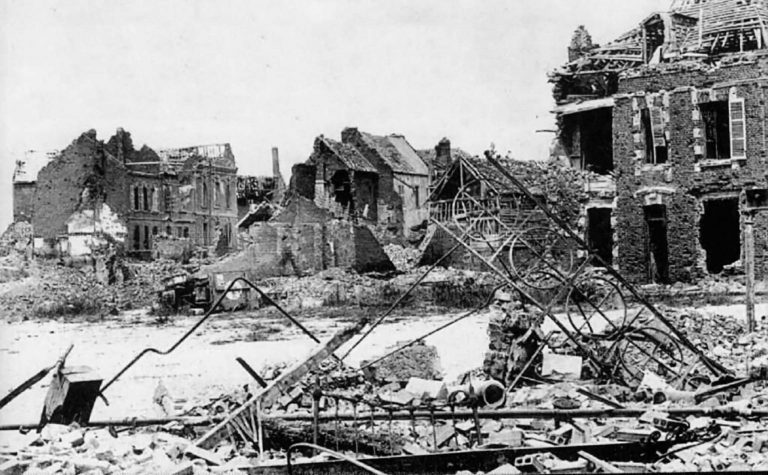
Contemporary postcard of Montdidier, which was destroyed in World War I
In the 1920s, as sub-prefect of the district of Montdidier, which the German army has practically leveled during the war, Combes is responsible for rapidly rebuilding the local towns.
Archives départementales de la Somme, Amiens
Contemporary postcard of Montdidier, which was destroyed in World War I
In the 1920s, as sub-prefect of the district of Montdidier, which the German army has practically leveled during the war, Combes is responsible for rapidly rebuilding the local towns.
Archives départementales de la Somme, Amiens
Conference Contributions
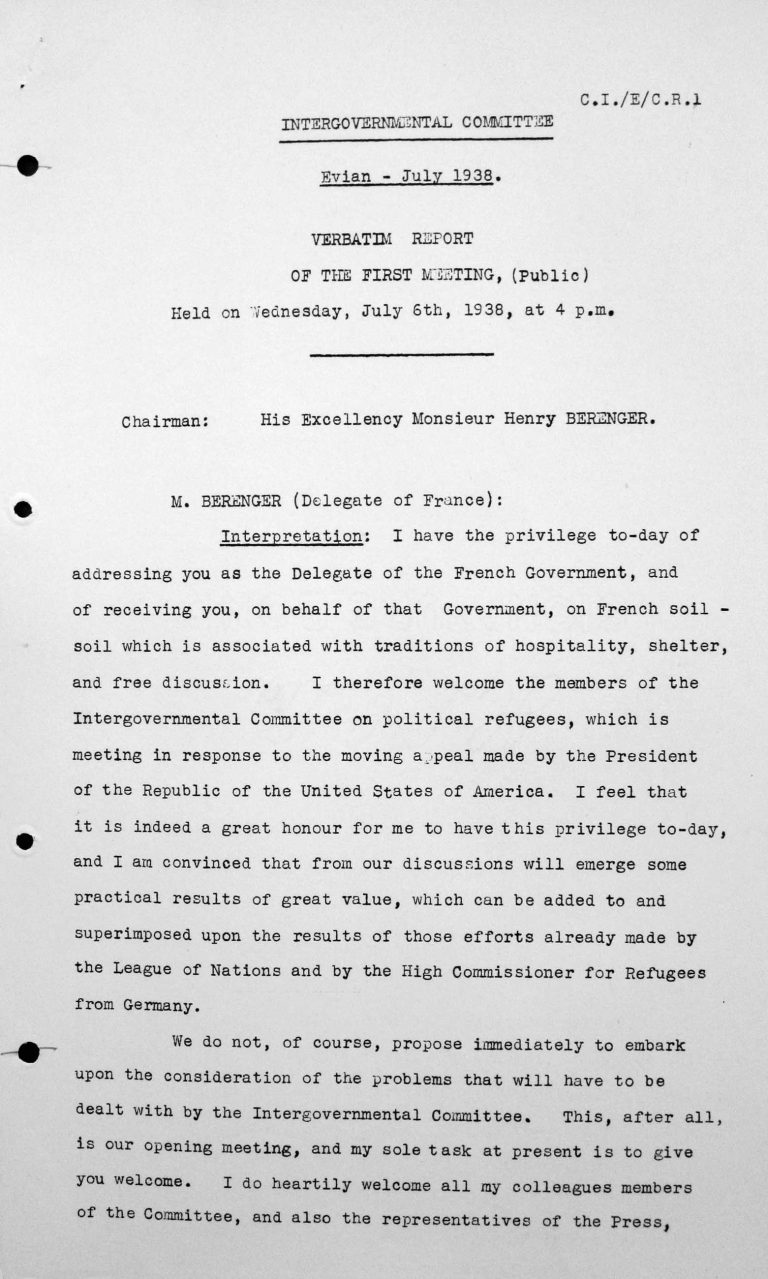
Welcome address by Henry Bérenger in the public session on July 6, 1938, 4pm, p. 1/4
Franklin D. Roosevelt Library, Hyde Park, NY
Welcome address by Henry Bérenger in the public session on July 6, 1938, 4pm, p. 1/4
Franklin D. Roosevelt Library, Hyde Park, NY
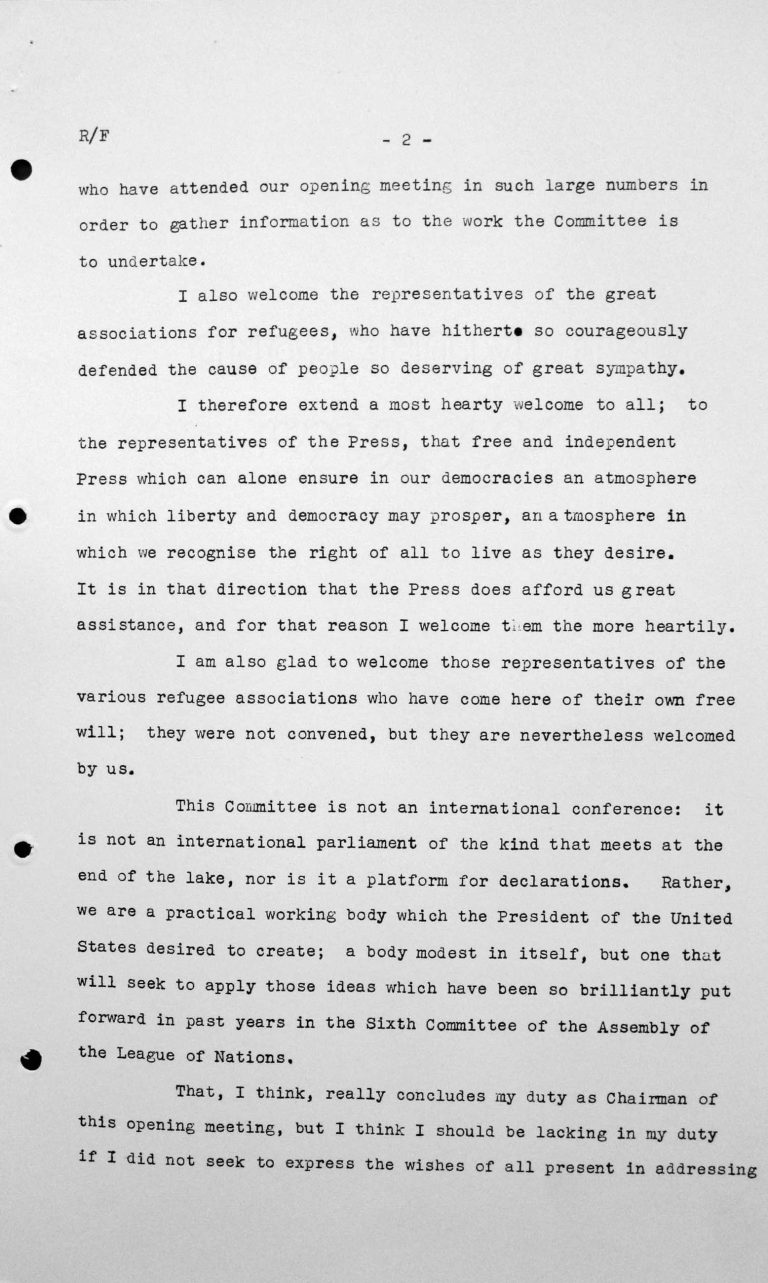
Welcome address by Henry Bérenger in the public session on July 6, 1938, 4pm, p. 2/4
Franklin D. Roosevelt Library, Hyde Park, NY
Welcome address by Henry Bérenger in the public session on July 6, 1938, 4pm, p. 2/4
Franklin D. Roosevelt Library, Hyde Park, NY
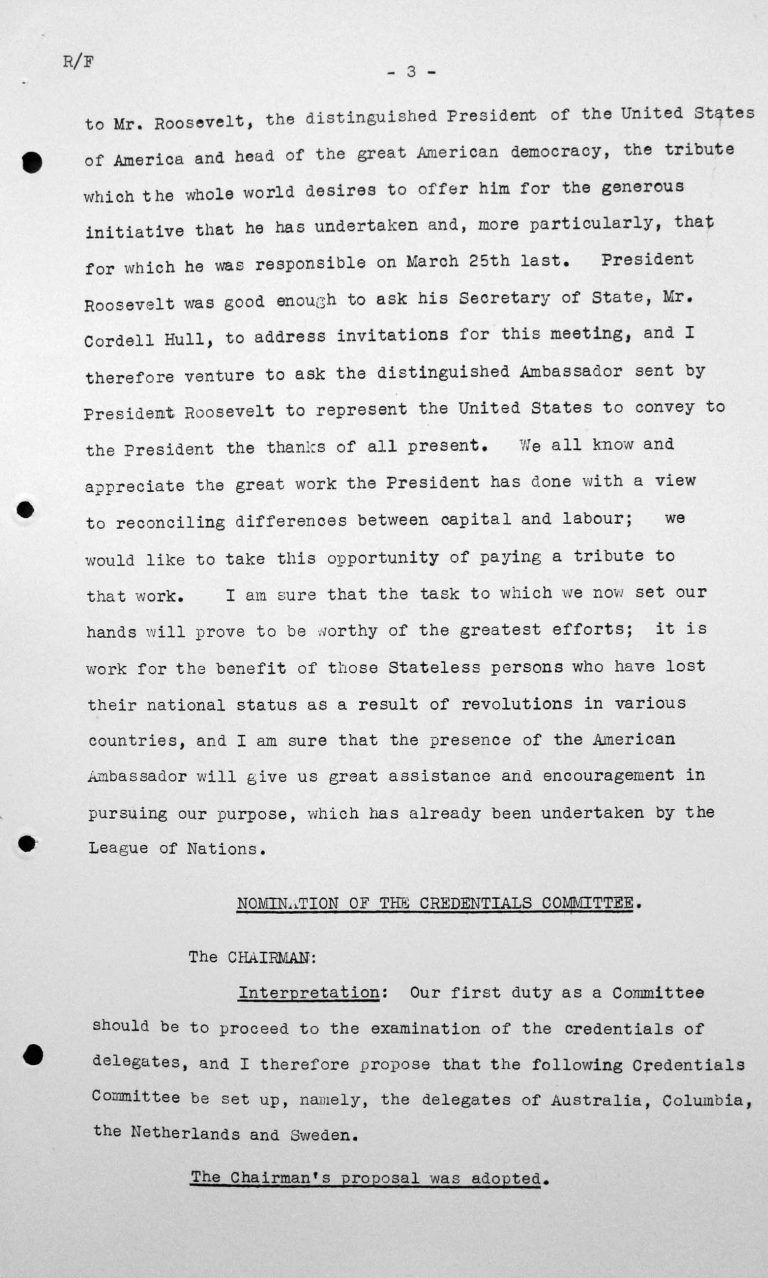
Welcome address by Henry Bérenger in the public session on July 6, 1938, 4pm, p. 3/4
Franklin D. Roosevelt Library, Hyde Park, NY
Welcome address by Henry Bérenger in the public session on July 6, 1938, 4pm, p. 3/4
Franklin D. Roosevelt Library, Hyde Park, NY
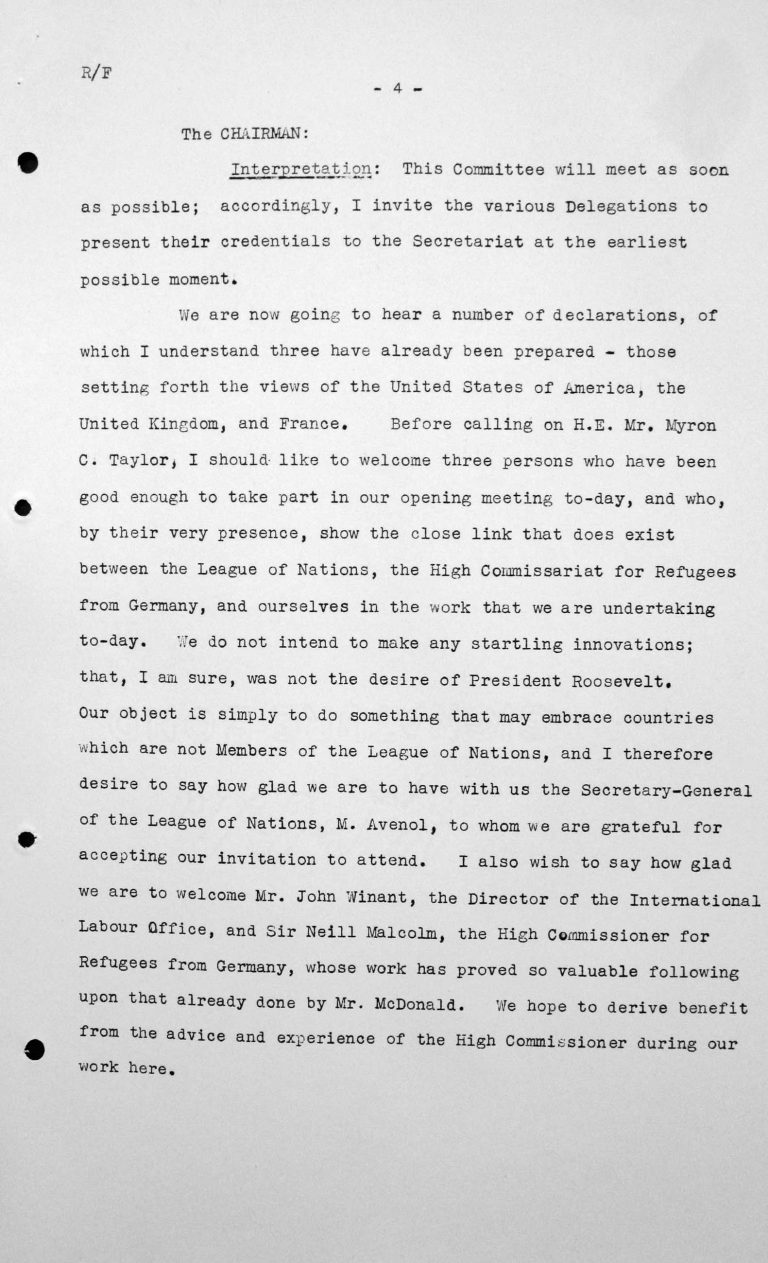
Welcome address by Henry Bérenger in the public session on July 6, 1938, 4pm, p. 4/4
Franklin D. Roosevelt Library, Hyde Park, NY
Welcome address by Henry Bérenger in the public session on July 6, 1938, 4pm, p. 4/4
Franklin D. Roosevelt Library, Hyde Park, NY
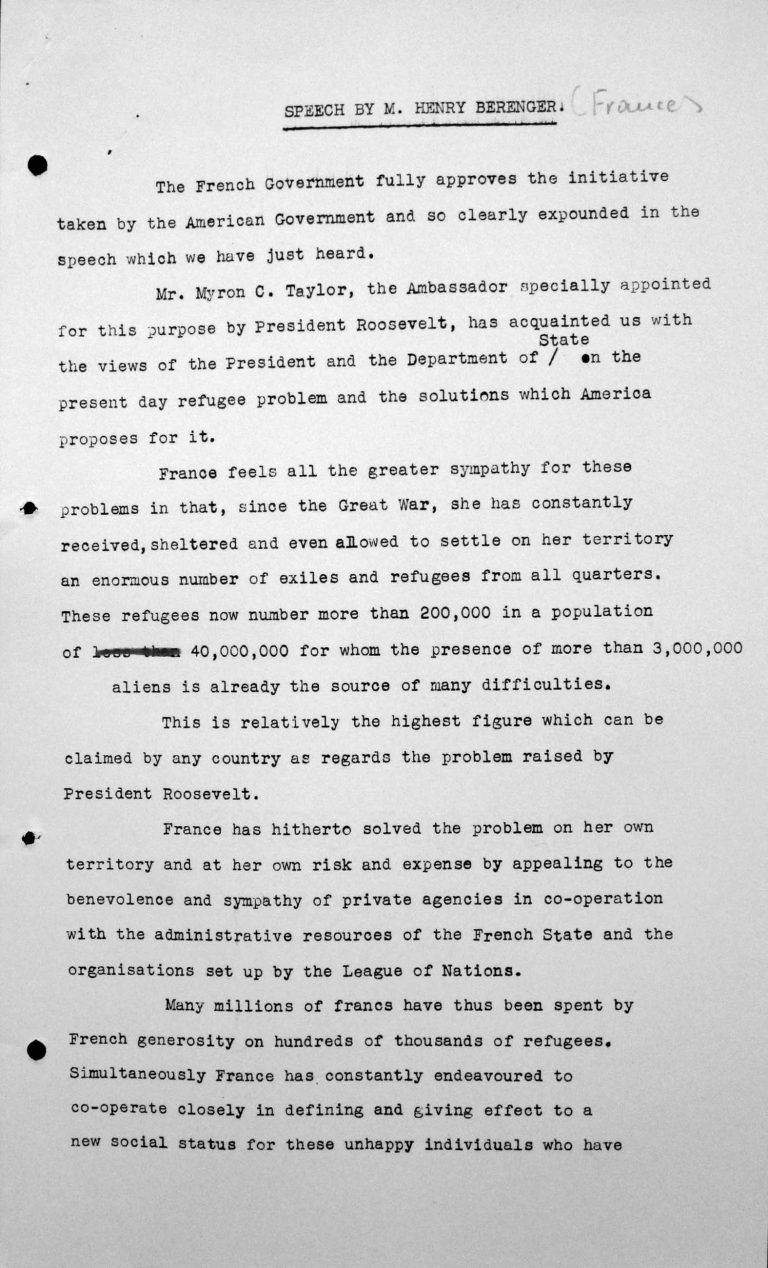
Statement by Henry Bérenger (France) in the public session on July 6, 1938, 4pm, p. 1/3
Franklin D. Roosevelt Library, Hyde Park, NY
Statement by Henry Bérenger (France) in the public session on July 6, 1938, 4pm, p. 1/3
Franklin D. Roosevelt Library, Hyde Park, NY
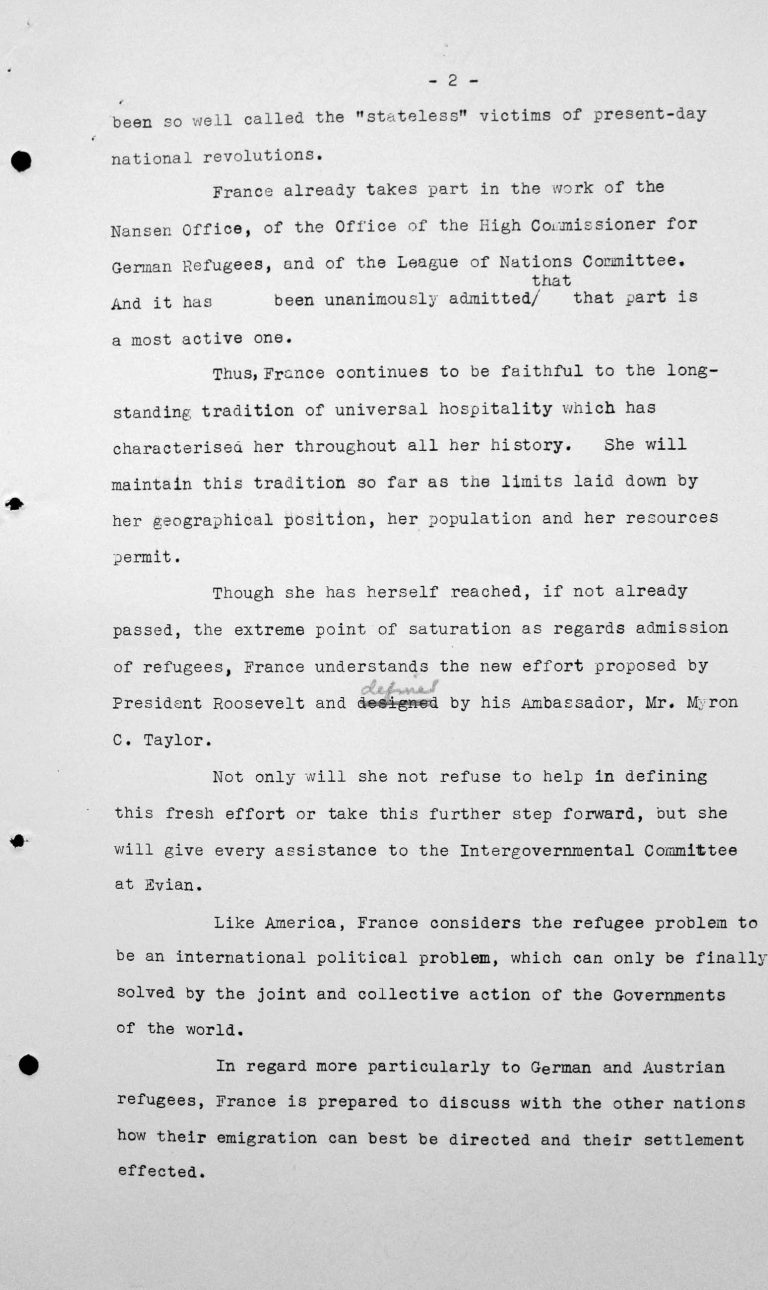
Statement by Henry Bérenger (France) in the public session on July 6, 1938, 4pm, p. 2/3
Franklin D. Roosevelt Library, Hyde Park, NY
Statement by Henry Bérenger (France) in the public session on July 6, 1938, 4pm, p. 2/3
Franklin D. Roosevelt Library, Hyde Park, NY
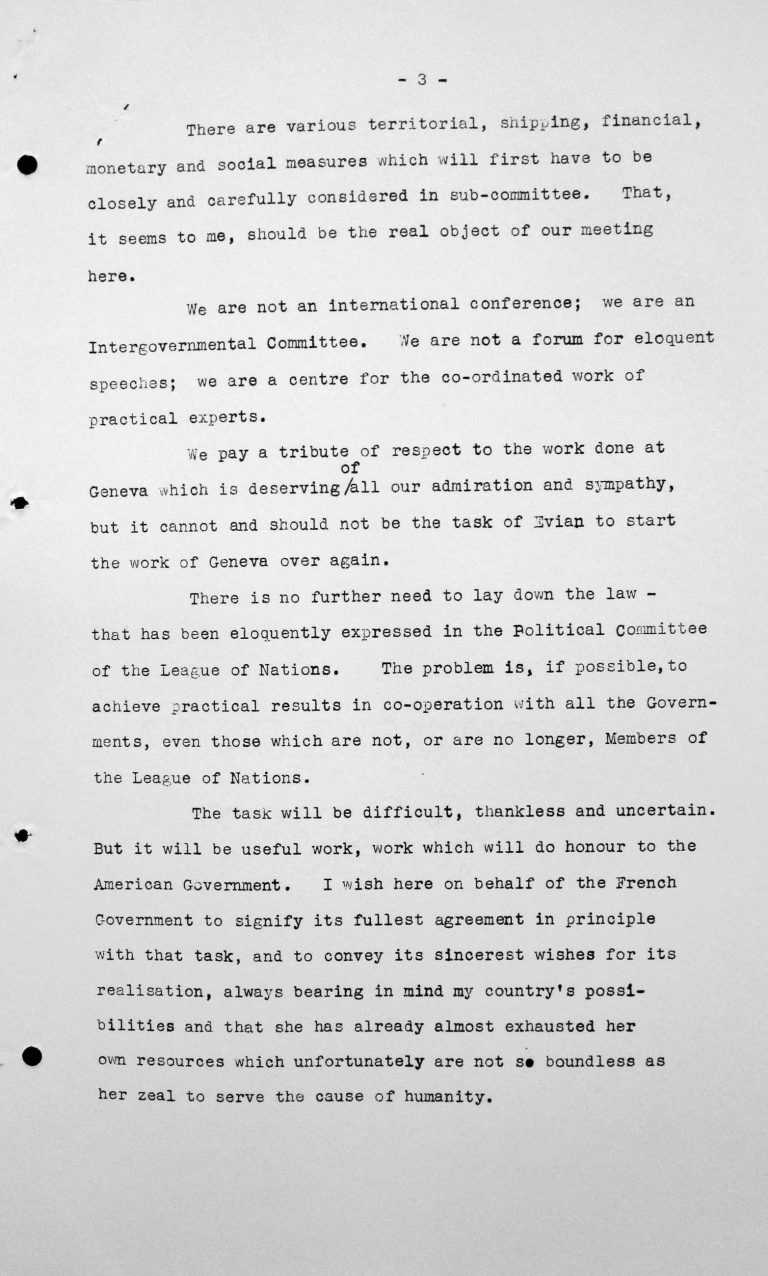
Statement by Henry Bérenger (France) in the public session on July 6, 1938, 4pm, p. 3/3
Franklin D. Roosevelt Library, Hyde Park, NY
Statement by Henry Bérenger (France) in the public session on July 6, 1938, 4pm, p. 3/3
Franklin D. Roosevelt Library, Hyde Park, NY
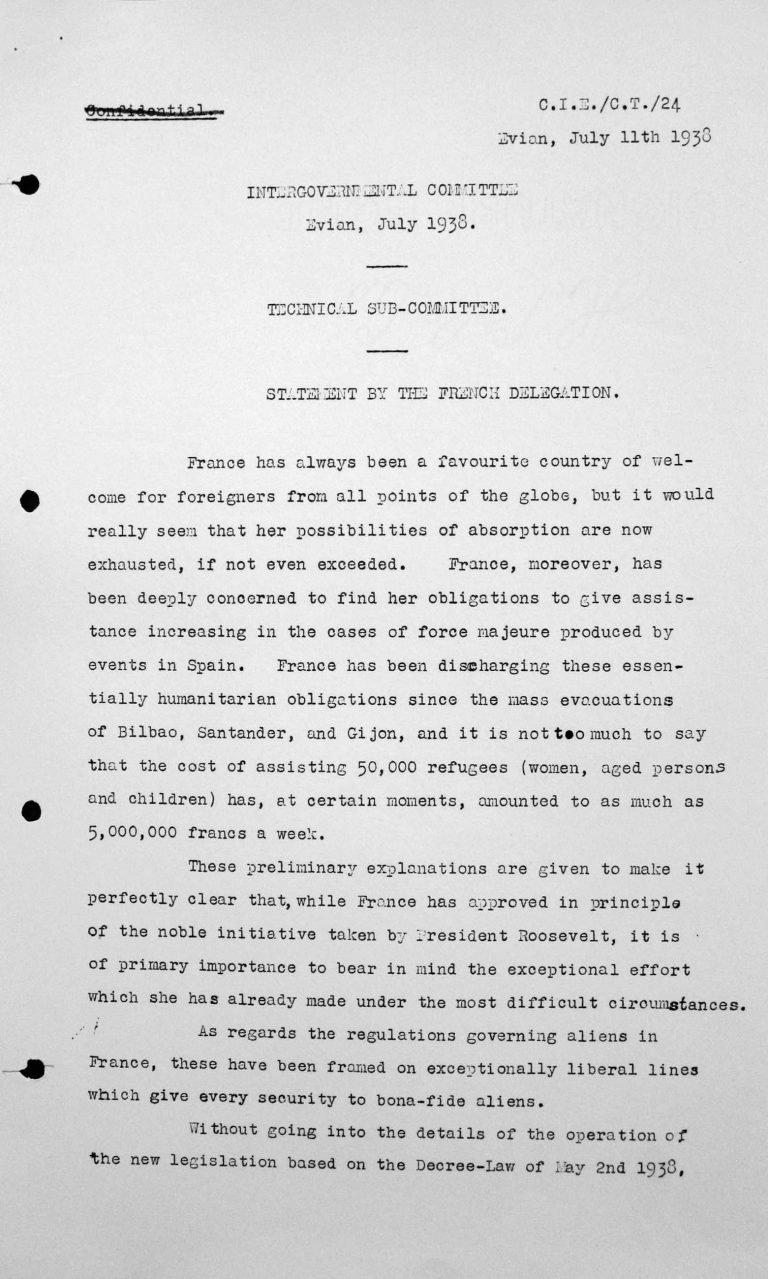
Statement of the French Delegation for the Technical Sub-Committee, July 11, 1938, p. 1/4
Franklin D. Roosevelt Library, Hyde Park, NY
Statement of the French Delegation for the Technical Sub-Committee, July 11, 1938, p. 1/4
Franklin D. Roosevelt Library, Hyde Park, NY
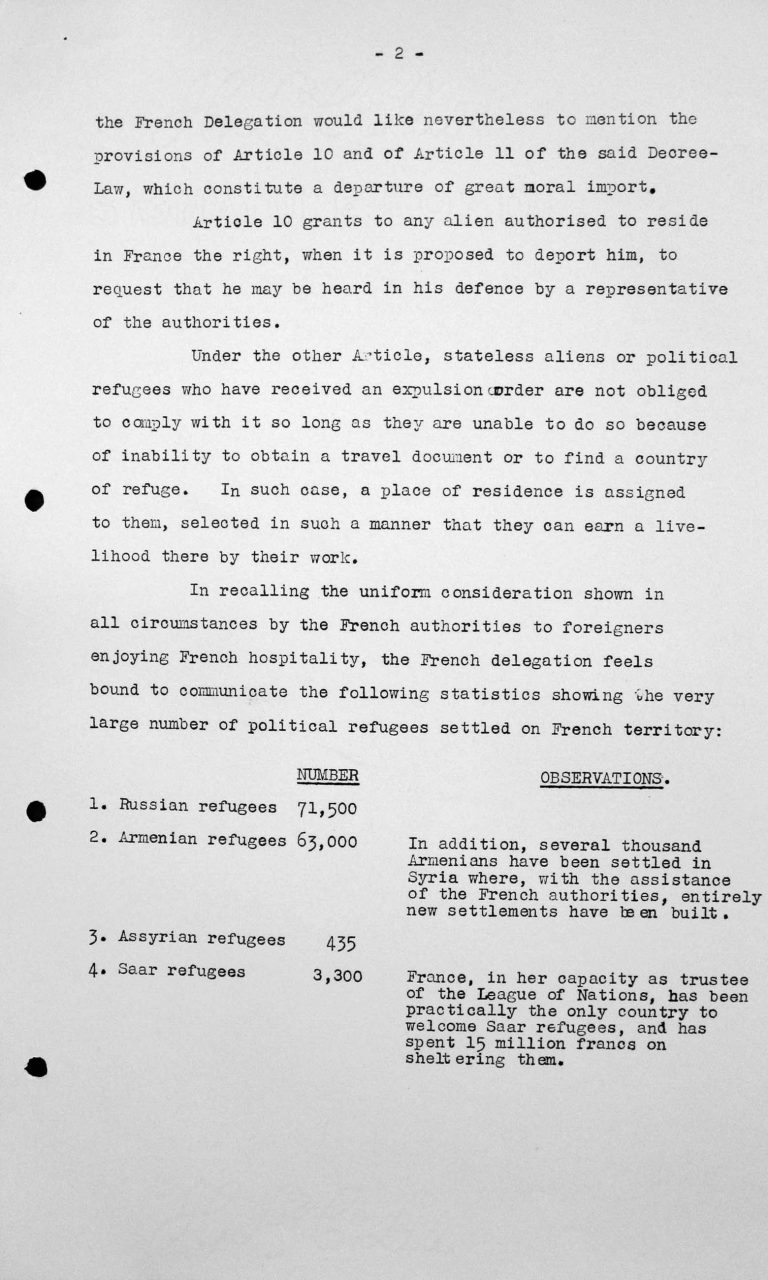
Statement of the French Delegation for the Technical Sub-Committee, July 11, 1938, p. 2/4
Franklin D. Roosevelt Library, Hyde Park, NY
Statement of the French Delegation for the Technical Sub-Committee, July 11, 1938, p. 2/4
Franklin D. Roosevelt Library, Hyde Park, NY
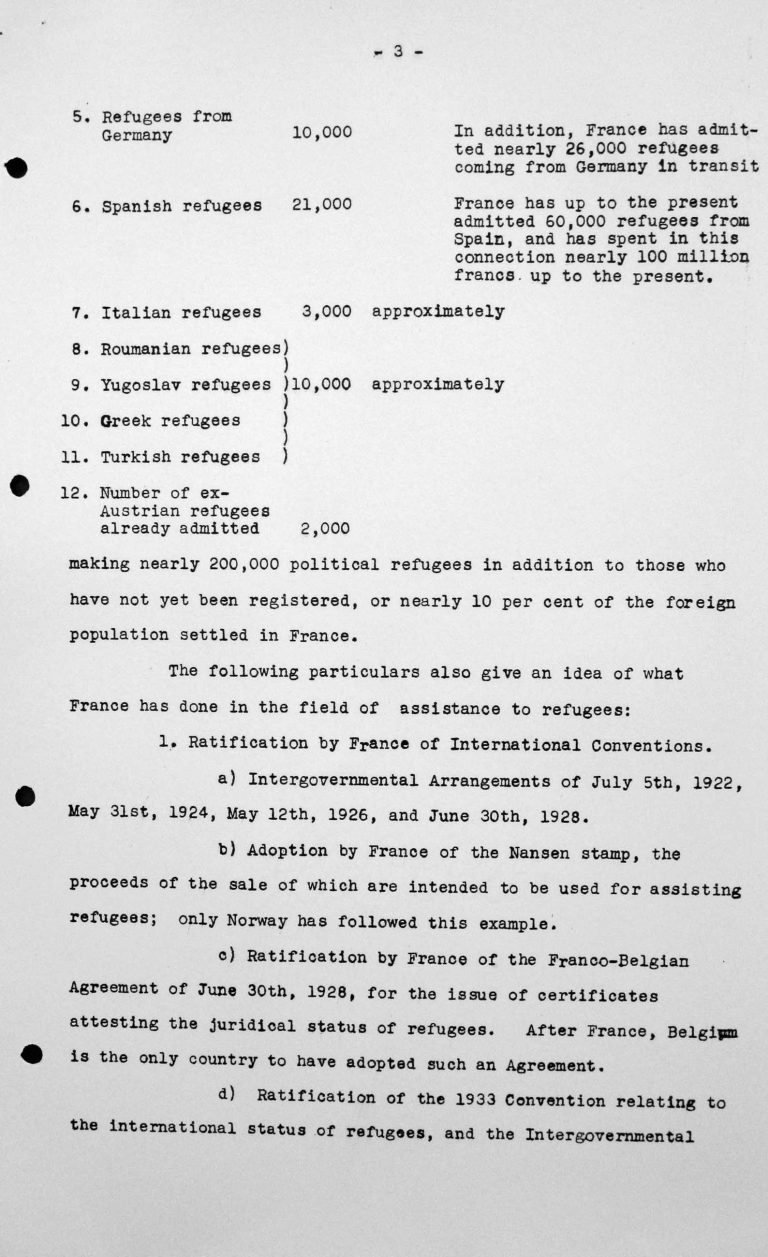
Statement of the French Delegation for the Technical Sub-Committee, July 11, 1938, p. 3/4
Franklin D. Roosevelt Library, Hyde Park, NY
Statement of the French Delegation for the Technical Sub-Committee, July 11, 1938, p. 3/4
Franklin D. Roosevelt Library, Hyde Park, NY
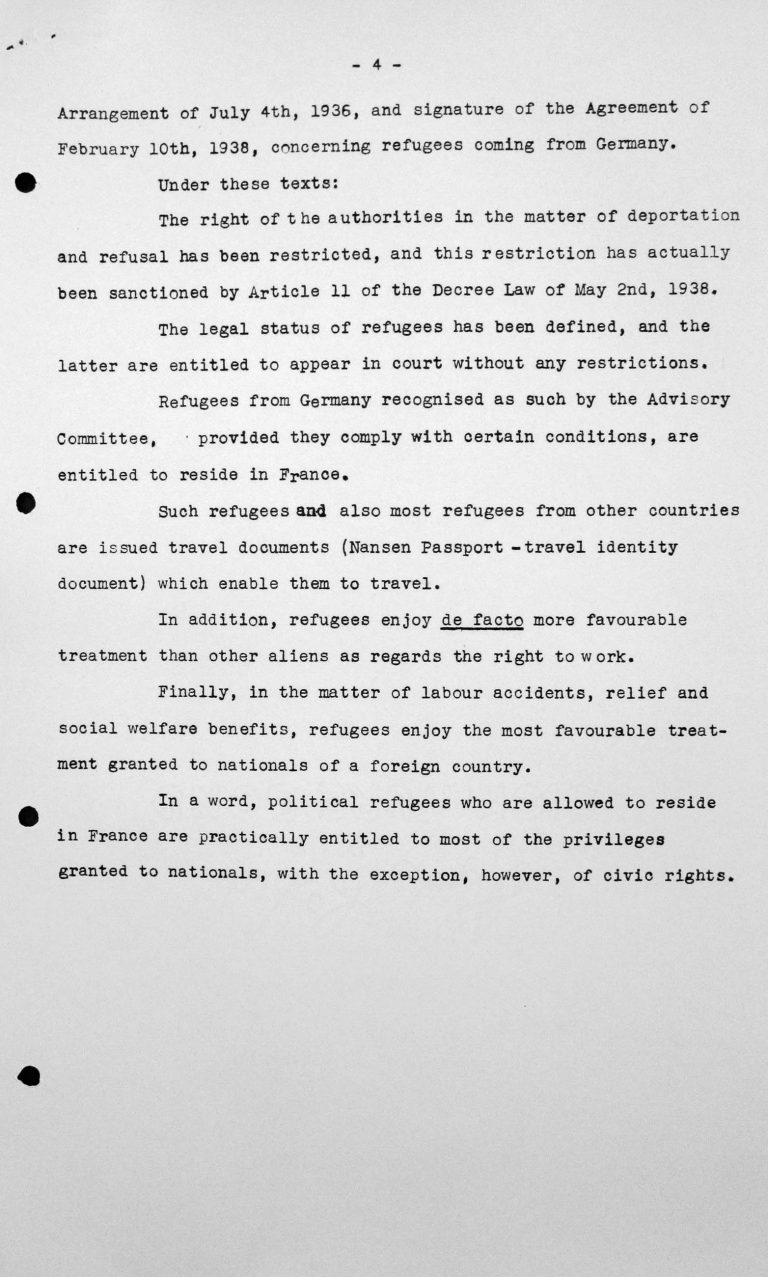
Statement of the French Delegation for the Technical Sub-Committee, July 11, 1938, p. 4/4
Franklin D. Roosevelt Library, Hyde Park, NY
Statement of the French Delegation for the Technical Sub-Committee, July 11, 1938, p. 4/4
Franklin D. Roosevelt Library, Hyde Park, NY
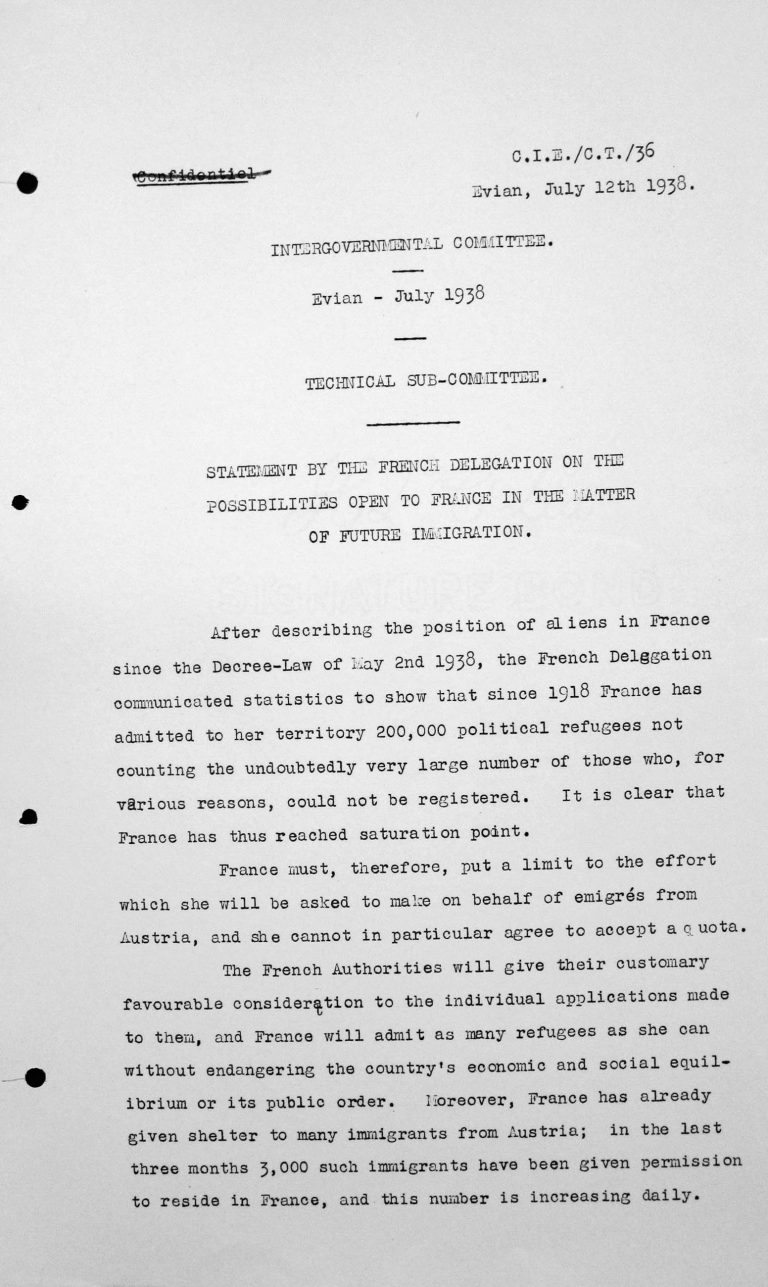
Statement of the French Delegation for the Technical Sub-Committe on the possibilities open to France in the matter of future immigration, July 12, 1938
Franklin D. Roosevelt Library, Hyde Park, NY
Statement of the French Delegation for the Technical Sub-Committe on the possibilities open to France in the matter of future immigration, July 12, 1938
Franklin D. Roosevelt Library, Hyde Park, NY
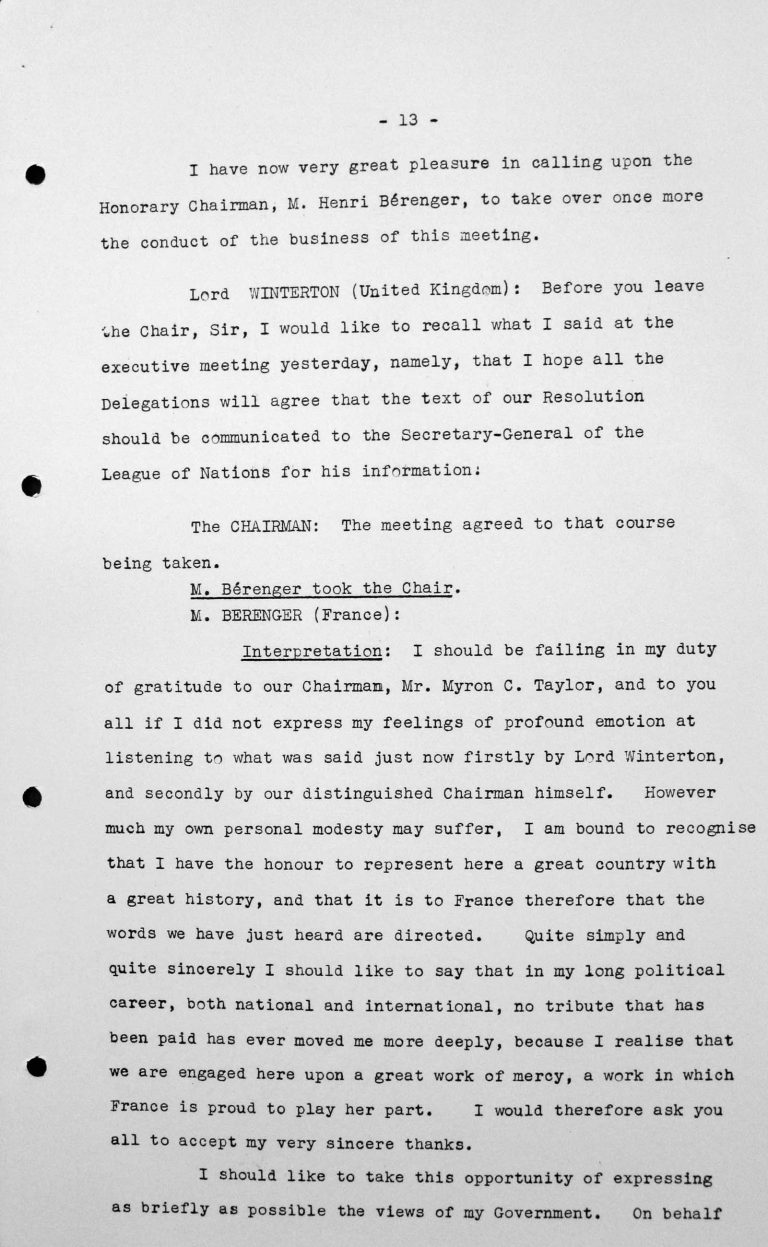
Closing Address by Henry Bérenger (France) in the public session on July 15, 1938, p. 1/6
Franklin D. Roosevelt Library, Hyde Park, NY
Closing Address by Henry Bérenger (France) in the public session on July 15, 1938, p. 1/6
Franklin D. Roosevelt Library, Hyde Park, NY
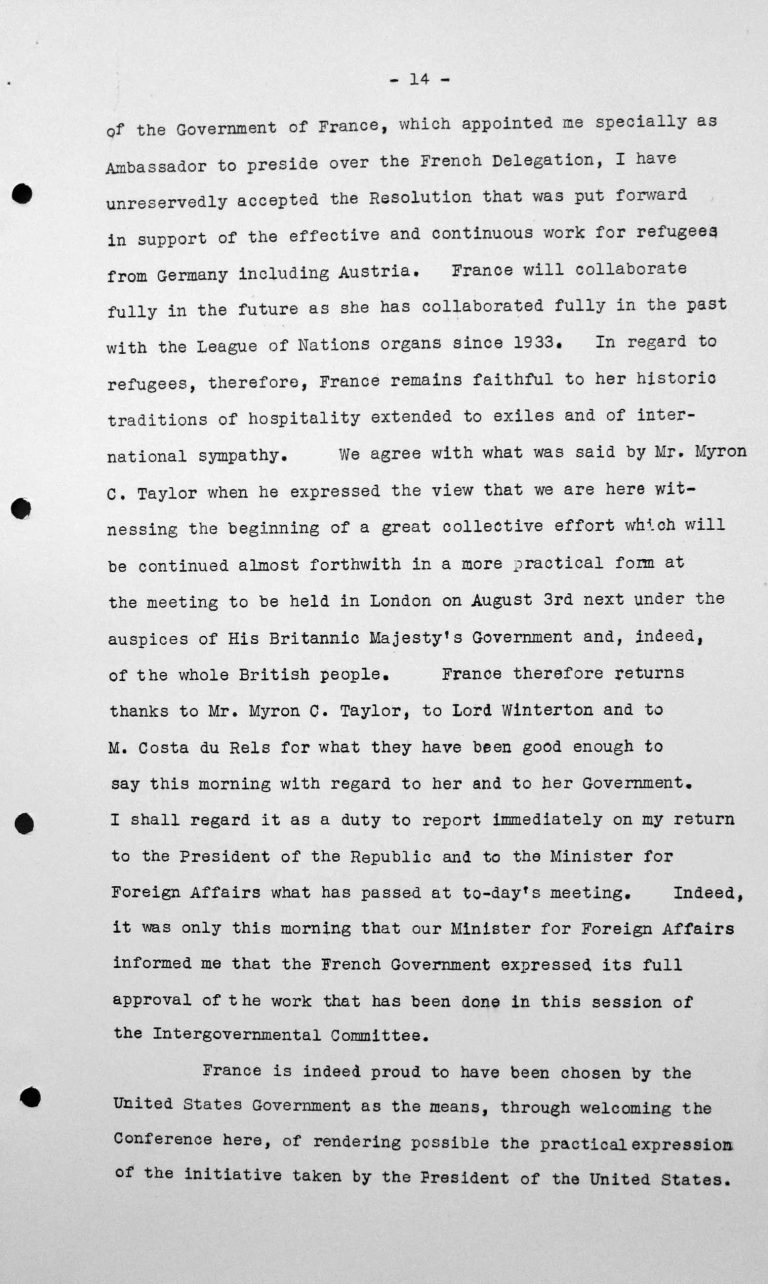
Closing Address by Henry Bérenger (France) in the public session on July 15, 1938, p. 2/6
Franklin D. Roosevelt Library, Hyde Park, NY
Closing Address by Henry Bérenger (France) in the public session on July 15, 1938, p. 2/6
Franklin D. Roosevelt Library, Hyde Park, NY
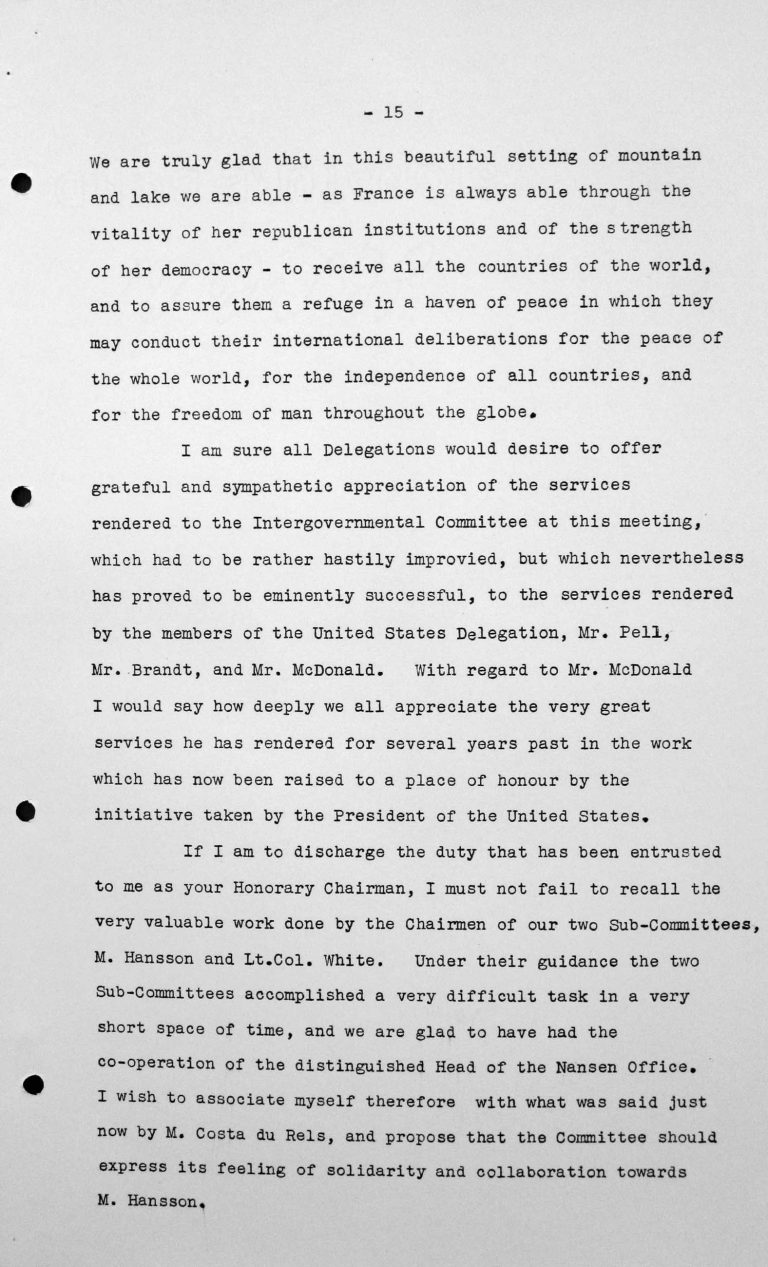
Closing Address by Henry Bérenger (France) in the public session on July 15, 1938, p. 3/6
Franklin D. Roosevelt Library, Hyde Park, NY
Closing Address by Henry Bérenger (France) in the public session on July 15, 1938, p. 3/6
Franklin D. Roosevelt Library, Hyde Park, NY
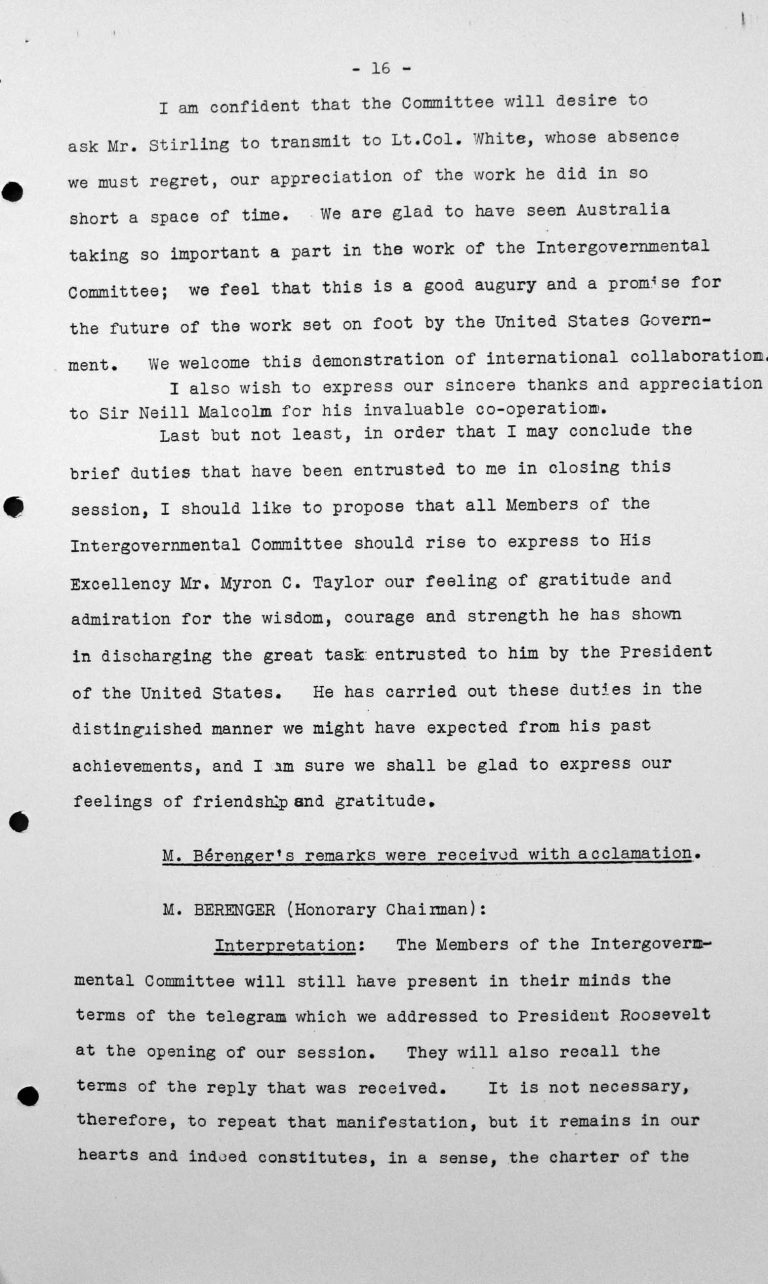
Closing Address by Henry Bérenger (France) in the public session on July 15, 1938, p. 4/6
Franklin D. Roosevelt Library, Hyde Park, NY
Closing Address by Henry Bérenger (France) in the public session on July 15, 1938, p. 4/6
Franklin D. Roosevelt Library, Hyde Park, NY
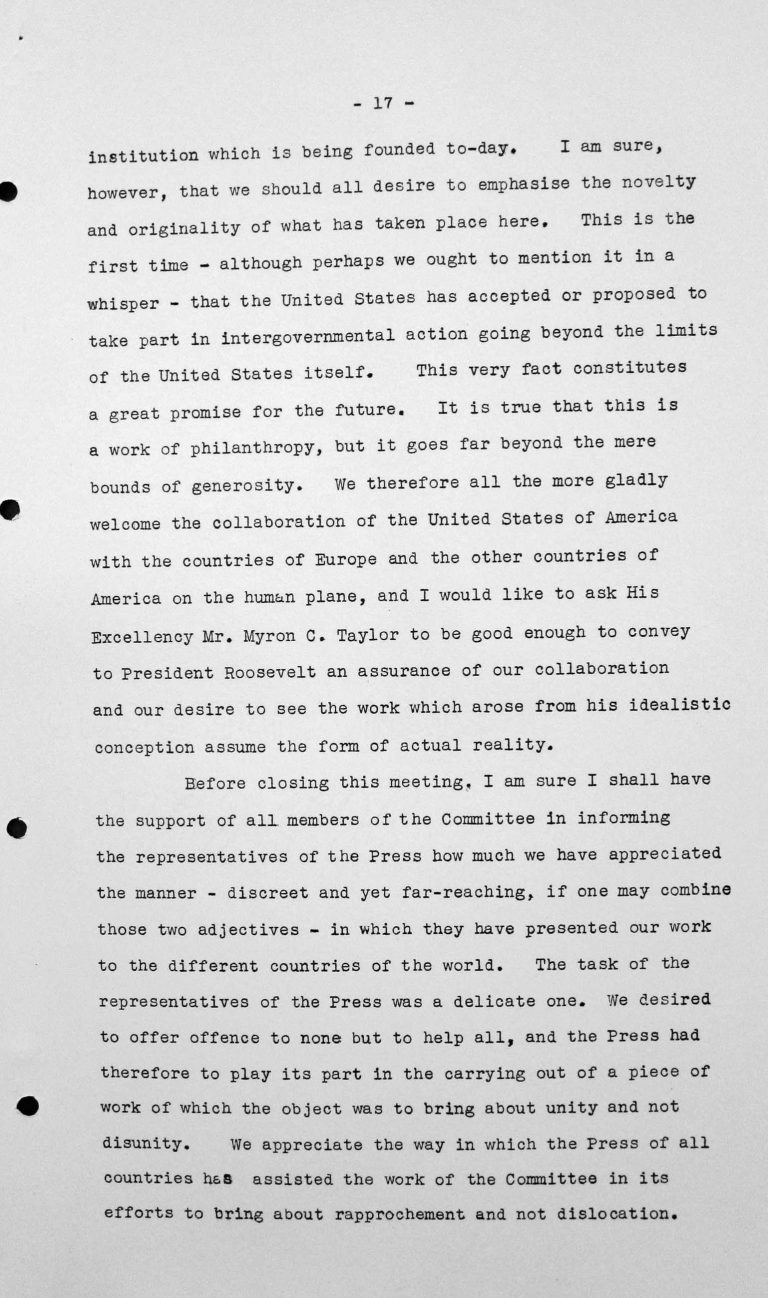
Closing Address by Henry Bérenger (France) in the public session on July 15, 1938, p. 5/6
Franklin D. Roosevelt Library, Hyde Park, NY
Closing Address by Henry Bérenger (France) in the public session on July 15, 1938, p. 5/6
Franklin D. Roosevelt Library, Hyde Park, NY
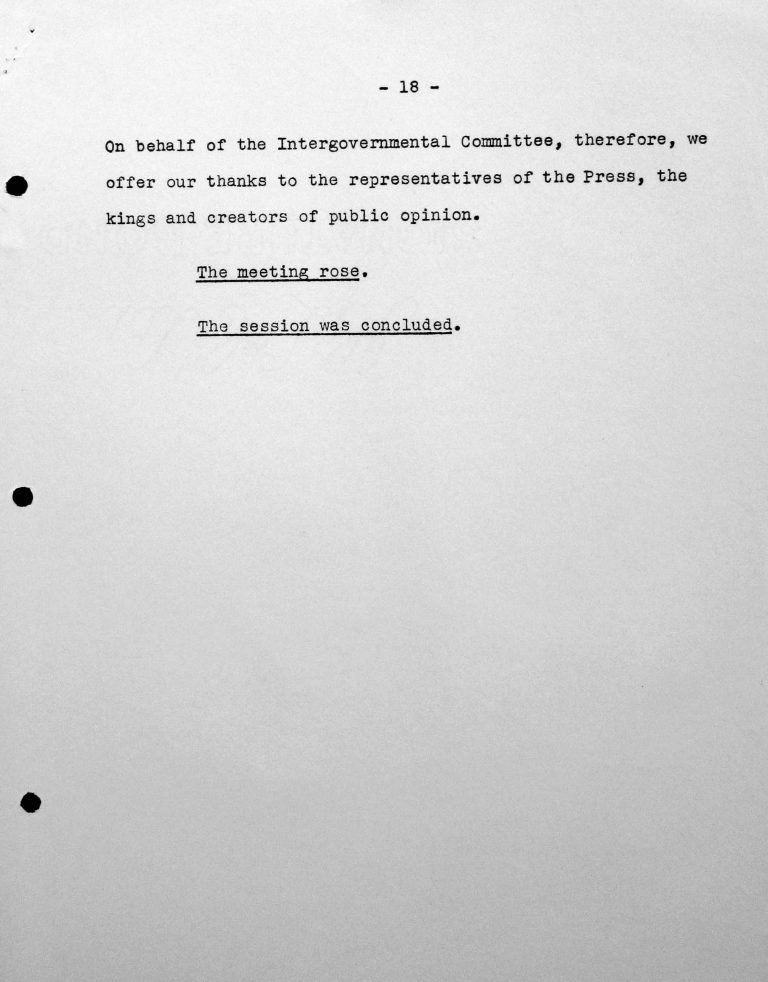
Closing Address by Henry Bérenger (France) in the public session on July 15, 1938, p. 6/6
Franklin D. Roosevelt Library, Hyde Park, NY
Closing Address by Henry Bérenger (France) in the public session on July 15, 1938, p. 6/6
Franklin D. Roosevelt Library, Hyde Park, NY
